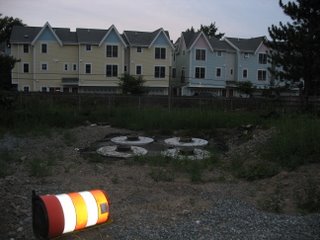Quotidiana
I was being harangued at the bar the other night.
"You see," he said, "that every itinerary is itself a place. You may move from one apartment to another three blocks away, and find that you are no longer in the same neighborhood; not because you've crossed a border, but only because the base sequence you encounter in your comings and goings has changed. What can seem bucolic from one angle can be nothing but paving and pigeon from another; oases become wholly habitual, and hideaways become theaters. The very in-between places that charmed in their irrelevance have become quotidiana."
I know all about quotidiana. I can quote it chapter and verse: to wring out the sponge when you're done with the dishes, to make long phone calls on Thursday nights, to run the dryer 55 minutes on hot,to reach the cafe before 9 on Saturday mornings (if you want to duck the crowd). These actions, even, are functionally somewhere where I've been sitting too long.


